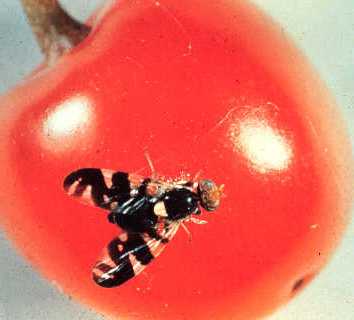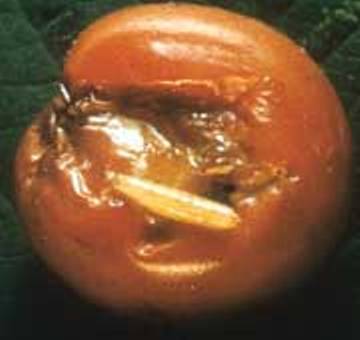|
Cherry Fruit Fly
Photo by Virginia Tech
Photo by Michigan State University View more pictures: Bing Images Google Images Yahoo Images Common names: Cherry Fruit Fly, Cherry Maggot Scientific name: Rhagoletis cingulata Region: This Fruit Fly is found in the northern United States and southern Canada. Life cycle: This insect produces one generation each year. The maggots hatch from eggs that are laid inside the cherries where they eat until they are fully-grown. They then drop to the ground to pupate in the ground at a depth of about one to three inches. They overwinter as pupae. Physical Description: The Cherry Fruit Fly is black with white stripes on the thorax and gold bars across its wings, and is only 1/10 to 1/5 inches long. Its eggs are yellow and are laid inside partially ripe fruit. The larva is 1/4 inches long. Feeding characteristics: This pest attacks cherry, pear and plum plants. The maggots develop from eggs laid in the cherries and feed until they are full-grown, causing them to be undersized or decayed. When the larvae reach maturity, they eat there way out and drop to the ground. Controls: The controls should be directed toward the adult fly, because once the eggs are laid, the damage has been done. Spray your trees with rotenone as soon as the flies appear. If trap counts remain high, repeat the application every seven to ten days. A trap can be fabricated by painting a 6 by 12 inch piece of plywood board a bright yellow. Mix the paint with a mixture of water and household ammonia, 50/50. Cover the board with a commercial sticky material and hang it 6 to 8 feet above the ground on the south side of the tree. For small orchards, use at least four traps. In larger orchards, hang a trap for every acre. The traps seem to work best when surrounded by foliage, and renew the ammonia and water bait each week, checking the stickiness every now and then. Cultivating the surrounding soil will also help by destroying the pupae, which overwinter within the top two inches of soil. Return from Cherry Fruit Fly to Insects A-D Encyclopedia of Garden Insects |

